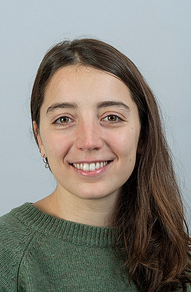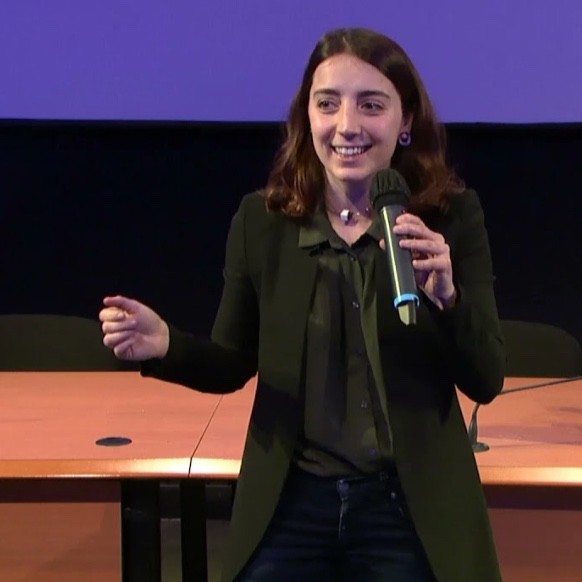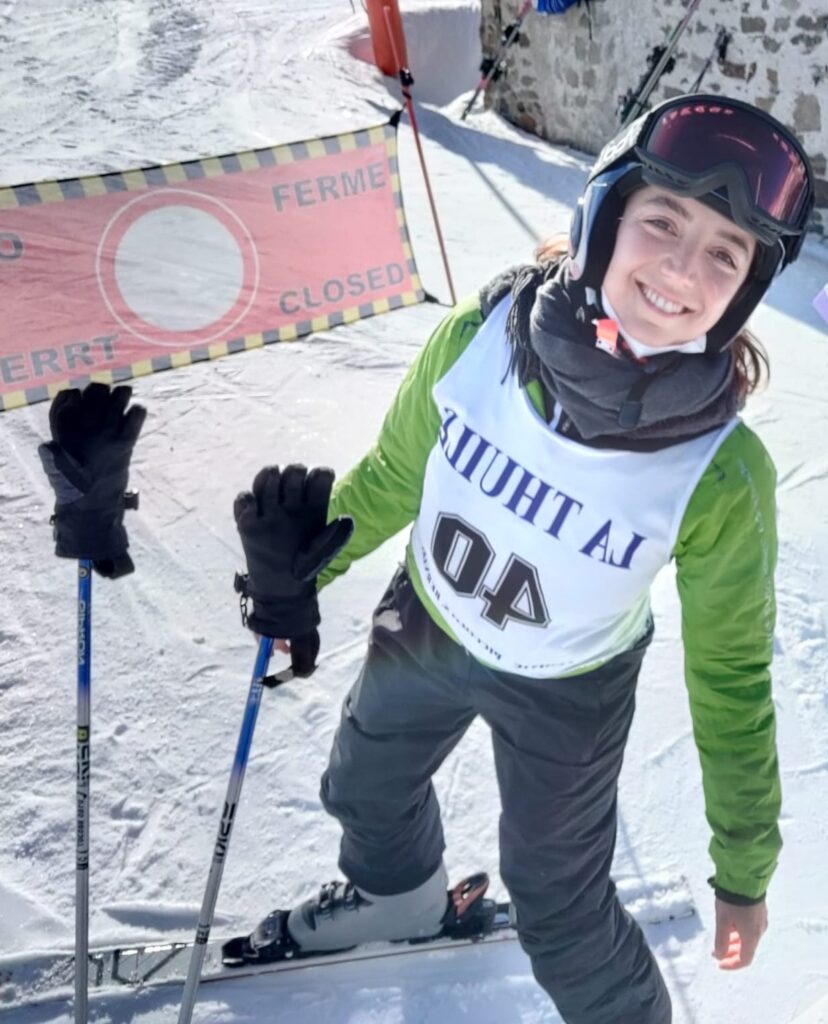Euclid is a space mission planned, built, and operated by more than 2000 scientists and engineers across Europe and other countries. In Portraits of Euclideans we showcase the people behind the mission.
In this portrait: Virginia Ajani, Scientist in the Interscience Task Force for Likelihood (ISTL)

- Can you tell us a little bit about your background?
I grew up in Turin, which is a city in the Northwest of Italy of about 800 000 inhabitants. I like it very much, because it is surrounded by the Alps and it has a very relaxed but not boring atmosphere. I did my bachelor in physics here and then I also pursued a master in theoretical physics at the University of Turin. After that I had the chance to spend six months at the Max Planck Institute for Astrophysics in Munich, which was an experience I enjoyed very much, because I had a chance for a first exposure to academia. I worked on fuzzy dark matter and explored the routine of a research group. For my PhD I moved to Paris. It was nice to be a student, as I had a chance to travel a lot thanks to conferences. As a Euclid PhD student, I enjoyed the Euclid summer schools a lot that were usually organised in nice locations in the South of France. They were great learning opportunities and opportunities to meet people that eventually became very close friends.
- What do you do now?
Now I came back to my home town. I had a postdoctoral position in Zurich at ETH and recently moved back to Turin, where I changed jobs. Now I am working in an institute for applied research that takes care of technological and knowledge transfer from scientific institutes to the civil industry. It spans a variety of different topics from climate change to mobility. Before with Euclid I was looking at images of the sky and now I am looking at images of Earth for several applications, like agriculture, climate, and so on.
- What was your role in the Euclid Consortium?
I mainly contributed during my PhD, when I joined the CosmoStat Laboratory. I first joined the weak lensing working group and contributed with my thesis on non-Gaussian statistics and then I also joined the interscience taskforce on likelihood development, where at the beginning I contributed to the definition of the initial data model that guided the code implementation. I was mostly contributing within the role of photometric expert, which means that I was reviewing tasks and checking the consistency between the theoretical recipes of the observables used by Euclid weak lensing or photometric galaxy clustering and the actual implementation within the code. Then I was also maintaining the documentation. I continued staying in Euclid during my postdoc, but then I also moved to the Dark Energy Survey and LSST. Therefore, my major contribution was during my PhD and now I will still continue to be a member of Euclid thanks to the University of Turin and the National Institute for Nuclear Research in Italy (INFN). My hope is to continue to contribute to Euclid from a more high performance computing (HPC) perspective to help accelerate or alleviate processes in some projects, maybe related to lensing or galaxy clustering.
- What is the most interesting or exciting thing about your job?
Something that is common between my past and current job is that I can still conduct my research, which I like very much. What I appreciate about my current job is the variety of topics that are covered. I can apply my scientific competence to several aspects that can impact society related to earth observations with applications on for example air quality, mapping vegetation and urban areas, agriculture or others from an HPC point of view. It is important to me that I can impact, hopefully in a positive way, society.
- What excites or interests you the most about Euclid?
So for sure the fact that it is one of the crucial experiments that will lead the way in cosmology and improve our knowledge of gravity, general relativity, and the effects to come. It will tell us more about the property and nature of dark matter and dark energy and maybe give some insight on modified gravity. But to be honest, what really thrills me the most is the technological achievement together with the scientific effort. Thinking that it is actually orbiting over us right now. I find it astonishing that through a collaborative effort it was possible to build detectors and an instrument that is literally trying to answer some of the most profound questions that we have in physics. Personally, I felt very lucky to virtually witness the launch. I think this is something that a lot of people would reply, but now I completely understand why my supervisors during my PhD continued to say that it is a perfect time for a PhD in Euclid.

- Can you tell us what the Euclid Interscience Task Force for Likelihood does?
The goal of the Interscience Task Force for Likelihood (ISTL) is to develop the code that will take care of the input data of Euclid, to compare it with the theoretical predictions, to perform a likelihood analysis, to explore the space of the cosmological parameters, and finally put constraints on cosmological parameters. It combines and gathers expertise from different working groups that are contributing both from a scientific point of view and also with code-development and management skills.
- How will your contribution help Euclid at large?
As I was mentioning before, my main contribution during the PhD and the postdoc were mostly focused on checking the implementation of theoretical recipes, but always on of the sort of theoretical modelling side, or on the statistical side in my PhD project, where I was extracting information from Euclid-like images. So, now that I’ve changed my role a bit. I hope I can continue to contribute from more of a computing side. My hope is to be able to alleviate some tasks, depending on the applications, that might be useful for some part of the analysis of Euclid or some related Euclid project.
- Why did you become a scientist and how?
A bit by chance. So in my case it wasn’t really planned, it wasn’t something I planned to do since I was a little kid. I actually attended a high school which was mainly focused on humanities. I was studying things like contemplating Greek philosophy and while we only had three hours per week of maths and physics. But then I read a book by Einstein, which was called “The World as I See It”, which is not really about hardcore science, but it’s mostly about how he sees society and culture. So I got curious and then I decided to go to check out some open days of the physics department at the university and jump in this unknown thing and role. The first year was pretty tough sinceI struggled a lot because my background didn’t cover much of what was taught. So I also got multiple times to change, but then I fortunately changed my approach. I tried to continue and fortunately by seeing things from different angles and being exposed to the same concept over and over helped me to go through it.
- Any advice for aspiring scientists or somebody who wants to become a scientist?
I think it’s very personal, but something I would suggest is to not be scared when some topics are tough, because maybe they are. So it’s nothing to be scared about, even if for some people it seems super easy. I would suggest trying to avoid comparisons in a competitive sense. Even if we are in systems that work like this, comparisons can be a demotivating tool instead of an empowering tool. And so when possible, to try to avoid comparison with others or with expectations. Try to focus on the things that are not clear and try to really be creative, try to see the same concept from different angles, for example, through writing or telling it to a person who is not from the background asking, try to create learning material, try to find some tricks to approach the topics that seem tough. Don’t be afraid to change scientific topics or even the place where you’re studying, if you can. In general, change can be a good thing, it can be also enriching sometimes.
- What’s your ultimate goal as a scientist?
My ultimate goal as a scientist is to try to use my competencies to have a positive impact on some aspects of society. I think that it’s very important to link science with clear communication, so that we can give access to complicated concepts in an easier way to people that have a different background. In general, I believe that if the majority of people, or ideally everyone, has access to complex ideas and complex concepts, we can collectively make informed decisions, and these decisions can benefit everyone.
- What would you do if you were not doing science?
I’m not sure. Something that comes to my mind is that when I was doing university, I was a volunteer for the ambulance emergency service for six years, and so this made me closer to the healthcare system, which I enjoyed a lot knowing. Maybe I would do something related to healthcare or physiotherapy. Something that is strictly related to human interaction.
- What do you do for fun?
In my free time, I enjoy going to the mountains for trekking, staying in nature or skiing. I also like to organise big, spontaneous dinners with friends. And in terms of entertainment, I like live concerts or stand-up comedy. I try to do some sports, like Aikido. I started it recently, which I like. It’s a fascinating discipline.



